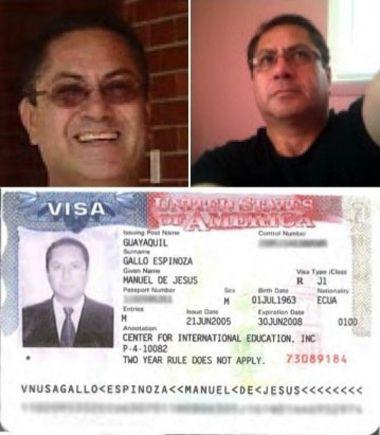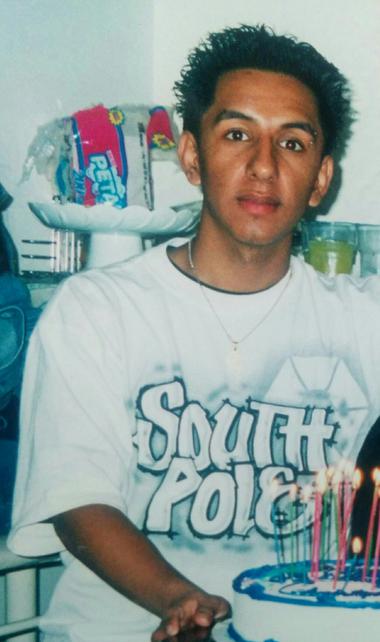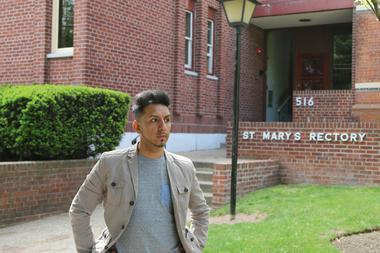|
EXCLUSIVE: Priest admits sex with minor, says teen 'wanted' it
By Mark Mueller
In an extraordinary admission of wrongdoing, a priest sought by authorities in New Jersey has acknowledged engaging in a sexual encounter with a 15-year-old boy, but he deflected blame for the incident by saying the teen "wanted" it and had "evil in his mind." In a telephone interview with NJ Advance Media, in email exchanges and in a lengthy post he shared publicly on Twitter, the Rev. Manuel Gallo Espinoza said it was a "mistake" to have sexual contact with the boy in the rectory of a Plainfield church in 2003. He said he fled to his native Ecuador after the victim told a nun and another priest that Gallo Espinoza raped him. "One thing that I am conscious (of) is he was at that time a teenager, and it is a big mistake for me. But I didn't force him to do anything he didn't want," Gallo Espinoza wrote. "He was older (sic) enough to walk away, but I think that I was attracted to him, that is the only explanation that I can think right now." Gallo Espinoza added: "He had something evil in his mind. He approached me many times." The 51-year-old priest, who was not questioned by detectives in 2003 because he could not be located, is now the subject of a criminal investigation by the Union County Prosecutor's Office. The agency reopened the long-dormant probe after inquiries by NJ Advance Media, which reported late last month that Gallo Espinoza returned to the United States in 2005 to work as a teacher. He said he went back to Ecuador when his visa expired last year and that he remains there now. To prove his identity, Gallo Espinoza provided his Social Security number, which matches the number issued to him by the federal government when he obtained work in the United States. He also offered details about the accuser and his family that are not widely known. The priest, who has been suspended from ministry since 2003, spoke with NJ Advance Media for nearly 20 minutes from a telephone with an Ecuadorian mobile number and exchanged a half-dozen emails with a reporter. Using the screen name "Unforgetables Unforgettables," he also wrote an 864-word comment beneath the July 30 story about him on NJ.com. Gallo Espinoza, who identified himself by name in the comment, later shared a copy of it on Twitter, along with one of his emails to NJ Advance Media. Gallo Espinoza said he does not consider himself a "pedophile person" and that he learned a lesson from the encounter. "I made a mistake once and that's (sic) was all," he said. "Being sincere with myself I decided to quit (the) priesthood by myself and start from zero and I did so. ... Since that moment because of that mistake I decided (to) not hurt anyone else and I began teaching." Asked by email if he realized he was committing a crime by having sex with a 15-year-old boy when he was 40, Gallo Espinoza responded, "I just came fr (sic) my country and really in Ecuador a person at 15 years old is not consider (sic) so innocent." He added that he had not had sex with other minors. "I haven't had anybody else," he wrote in an email. Gallo Espinoza's accuser, Max Rojas Ramirez, said the priest raped him in a bedroom of the rectory at St. Mary's Church in Plainfield shortly before Easter in 2003. Ramirez, now 28 and living in Elizabeth, was an altar boy and a member of the parish's youth group at the time. He said Gallo Espinoza attacked him weeks after he told the priest in confession that he was confused about his sexuality. Ramirez flatly denies Gallo Espinoza's contention that he sought anything more than counsel. "I saw him as a priest, and that's it," Ramirez said. "I didn't even know who was in the confessional when I went in there." He added that he was gratified Gallo Espinoza admitted the encounter, saying it shows he has been telling the truth. NJ Advance Media does not typically name victims of sexual assault. It is doing so in this case at the request of Ramirez, who said he has nothing to hide. In March, Ramirez filed suit against the Archdiocese of Newark, saying it was responsible for the priest's behavior and should have established stronger protections. The incident took place just a year after the nation's bishops — badly shaken by the church's sex abuse crisis — established a landmark document known as the Charter for the Protection of Children and Young People. Gallo Espinoza made reference to Ramirez's lawsuit in his correspondence, saying the victim had revived the issue after 12 years to cash in. "The explanation that I find to begin again with this incident after many years is 'EASY MONEY,'" Gallo Espinoza wrote. He repeatedly blamed his use of alcohol the night he took Ramirez to the rectory, saying he drank too much because he was depressed, lonely and homesick. In later emails, Gallo Espinoza sought to retract his admission, saying he was so drunk he didn't remember the incident and simply accepted Ramirez's claims. "I (sic) drunk and I was confused with beer because the beer in my country doesn't have much alcohol. Everything was new for me," he wrote. "Max walked with me. I don't remember. He maybe helped me get to my room because I don't remember how I got there." Gallo Espinoza, who had served at St. Mary's for three years leading up to the sexual encounter, said he wanted to speak out to prove that he is a good person and that he is not a danger to others. "I want people (to) know that a mistake made in my life doesn't define myself that way," he wrote in an email. "I am a man dedicated to teach doing my best to help students to get ready to be successful in life." He said he continues to teach in Ecuador, earning $520 per month, though he did not say where. His LinkedIn account indicates he works at a local language institute, and another social media profile lists his residence in Macara, in the province of Loja on Ecuador's southern border. Gallo Espinoza was a priest of the Diocese of Loja when he came to the Archdiocese of Newark. He added that stress from the incident has contributed to lasting medical problems, chiefly gastritis and colitis, and that his life is now more difficult following publication of the NJ Advance Media story on July 30 because "people doesn't (sic) accept this kind of incident." He implored a reporter to examine his teaching record in the United States, saying it would prove to be free of controversy. NJ Advance Media found that Gallo Espinoza taught English as a second language at Beville Middle School in Prince William County, Va., from 2005 to 2008. He then worked as a Spanish teacher at Parkdale High School in Prince George's County, Md., from May 1, 2008, through Feb. 28, 2014. A spokesman for the Virginia school district declined to release additional information about the former teacher. In the Maryland district, a spokesman said he was unaware of any sexual improprieties. It was not immediately clear how Gallo Espinoza's admission will impact the criminal investigation. Mark Spivey, a spokesman for the prosecutor's office, declined to comment on the status of the probe or on the priest's statements. The criminal statute of limitations on sexual assault was abolished by the state Legislature in 1996. Should the prosecutor's office charge Gallo Espinoza in absentia, it faces the hurdle of extraditing him. The United States and Ecuador do have an extradition treaty, but a 2012 analysis by the online magazine Slate found the South American nation to be among the least cooperative partners. Between 2003 and 2011, the analysis found, Ecuador declined to extradite a single person to the United States, while its neighbors, Peru and Colombia, turned over 28 people and 1,201 people, respectively, in the same time period. Requests for extradition must be funneled through the Department of Justice's Office of International Affairs, which then enlists the State Department in issuing a formal request that a fugitive be turned over, according to the DOJ's website. A Justice Department spokesman said he could not comment on specific cases. Beyond the fate of Gallo Espinoza, the circumstances of his departure raise new questions about those who were made aware of it early on. Ramirez has said that within days of the attack, he reported it to Jeivi Hercules, his godfather, and Antonino Salazar, then the leader of the charismatic youth group at St. Mary's. Both men confronted the priest, Ramirez said. Shortly afterward, he said, Salazar brought him to a Catholic Charities office, where Ramirez told a nun and a priest what had happened. The account is confirmed by a transcript of an interview Salazar gave to police in 2003. It was Catholic Charities that ultimately notified the prosecutor's office, records show. While the circumstances of Gallo Espinoza's abrupt departure have never been fully disclosed, he said in the telephone interview it was Salazar and Hercules who told him to run. Hercules, who has since entered the priesthood, is now parochial vicar at Queen of Peace Church in North Arlington. "They said, 'You're going to get in big trouble. You better leave. ... God prays for you. Go back to your country,'" Gallo Espinoza said. Before leaving, he said, he attended confession with another priest and admitted what he did. Under the so-called seal of confession, priests are not permitted to disclose anything they are told, even to aid the cause of justice, according to canon law. Gallo Espinoza said he then bought a plane ticket, which he described as extremely expensive because it was purchased at the last minute. He said he did not inform Archbishop John J. Myers or any other official of his plan to run. Hercules has not responded to numerous requests for comment. Jim Goodness, a spokesman for the archdiocese, said the priest would not consent to an interview. Informed of Gallo Espinoza's contention that Hercules told him to leave the country while aware of the rape accusation, Goodness declined to comment. Salazar, whose English is limited, was interviewed briefly at his home in Middlesex Borough. He said he had previously spoken to police and to lawyers for the Archdiocese of Newark and that he did not want to discuss the case again. When a reporter returned with a Spanish-language interpreter to fully explain Gallo Espinoza's claim, Salazar's wife said they would have no comment. Before cutting off contact with NJ Advance Media, Gallo Espinoza said repeatedly that he loved the United States, which he likened to an adopted homeland, and said he wanted to speak with Ramirez to apologize and to "clarify things." "You know my truth, and I don't want to make this situation bigger, but to look for a humble solution," he wrote in an email. "... God bless America. I love it with all my heart." Contact: mmueller@njadvancemedia.com
|
.
Any original material on these pages is copyright © BishopAccountability.org 2004. Reproduce freely with attribution.


